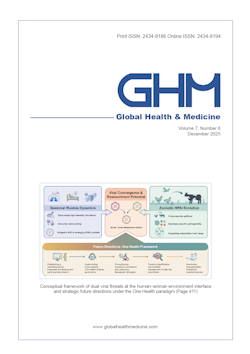Global Health & Medicine 2020;2(4):240-246.
Impact of sex and histology on the therapeutic effects of fluoropyrimidines and oxaliplatin plus bevacizumab for patients with metastatic colorectal cancer in the SOFT trial
Yamada Y, Muro K, Takahashi K, Baba H, Komatsu Y, Satoh T, Goto M, Mishima H, Watanabe M, Sakata Y, Morita S, Shimada Y, Takenaka N, Hirooka T, Sugihara K
Mechanisms accounting for sex differences in the incidence of adverse events caused by fluoropyrimidine treatments, and histologic differences in efficacy are insufficiently understood. We determined differences between the sexes in terms of the safety of S-1 plus oxaliplatin (SOX)/bevacizumab-versus-l-leucovorin, 5-fluorouracil (5-FU) and oxaliplatin (FOLFOX)/bevacizumab, and the impact of histology on their therapeutic effects, in 512 unresectable metastatic colorectal cancer patients from the SOFT phase III study. Nausea (OR: 2.88, P < 0.001) and vomiting (OR: 3.04, P = 0.005) occurred more frequently in females than males treated with SOX/bevacizumab, while nausea (OR: 2.12, P = 0.006), vomiting (OR: 3.26, P = 0.004), leukopenia (OR: 2.61, P < 0.001), neutropenia (OR: 2.92, P < 0.001), and alopecia (OR: 4.13, P < 0.001) were higher in females on FOLFOX/bevacizumab. Mean relative dose intensities (RDIs) of S-1 during all cycles of SOX/bevacizumab were significantly lower in females (73.9%) than males (81.5%) (P < 0.001), while RDIs of continuous infusion of 5-FU in the FOLFOX/bevacizumab regimen were 75.0% in females and 80.5% in males (P = 0.005). No significant differences in efficacy with regard to overall survival (OS) and progressionfree survival (PFS) were identified between the sexes for either SOX/bevacizumab or FOLFOX/bevacizumab treatment. Patients with poorly-differentiated adenocarcinoma had significantly worse OS (HR: 2.72, 95% CI: 1.67-4.44, P < 0.0001) and PFS (HR: 1.89, 95% CI: 1.18-3.02, P = 0.0079) than patients with well- or moderately-differentiated adenocarcinoma. Female patients experienced more frequent and severe adverse reactions to SOX/bevacizumab and FOLFOX/bevacizumab and a worse prognosis for poorly-differentiated adenocarcinoma were confirmed in this phase III study. This warrants further translational research to identify the responsible mechanisms.
DOI: 10.35772/ghm.2020.01050







